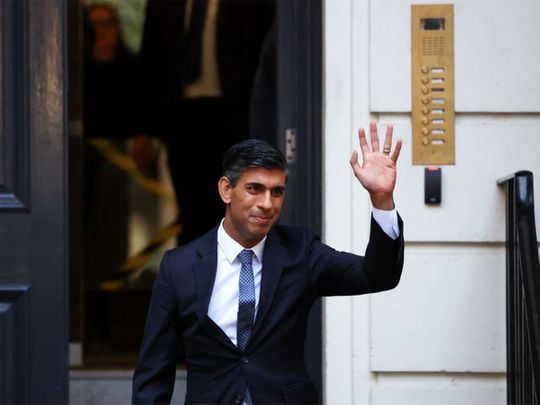
* Sunak becomes first UK leader of colour
* He may be appointed by King Charles on Tuesday
* Warns UK faces a profound economic challenge
* Sunak expected to keep Hunt, tap allies for his new UK Cabinet
London: Rishi Sunak will become Britain's next prime minister on Tuesday, Downing Street said on Monday. Sunak was due to meet King Charles on Tuesday morning before speaking outside No. 10 Downing Street.
Outgoing Prime Minister Liz Truss will chair a meeting of Cabinet and make a statement outside 10 Downing Street at about 10:15am (UK time), according to the statement. She will then travel to Buckingham Palace to meet the monarch.
Sunak will then make the same journey to the palace, before delivering his first speech as prime minister at about 11:35am (UK time) in Downing Street, according to the statement.
He won the race on Monday to lead the Conservative Party, tasked with steering a deeply divided country through an economic downturn set to leave millions of people poorer.
One of the wealthiest politicians in Westminster, Sunak will become the country's first leader of colour - and its third prime minister in less than two months - as he takes over during one of the most turbulent eras in British political history.
He replaces Liz Truss, who only lasted 44 days before she resigned, needing to restore stability to a country reeling from years of political and economic turmoil, and seeking to lead a party that has fractured along ideological lines.
He told his lawmakers in parliament that they faced an "existential crisis" and must "unite or die". He told the country it faced a "profound economic challenge".
"We now need stability and unity, and I will make it my utmost priority to bring our party and our country together," he said.
Sunak will step up to lead Britain as it heads for one of the toughest downturns in decades.
The multi-millionaire former hedge fund boss will be expected to launch deep spending cuts to try to rebuild Britain's fiscal reputation, just as the country slides into a recession, dragged down by the surging cost of energy and food.
A recent mini budget by Truss, which triggered her downfall, pushed up borrowing costs and mortgage rates, and sent investors fleeing.
Sunak, likely to be appointed prime minister by King Charles on Tuesday, will also have to work hard to hold Britain's dominant political party together after some accused him of treachery earlier this year when he resigned from the cabinet of former leader Boris Johnson, triggering his downfall too.
Other Conservatives say he is too rich to understand the day-to-day economic pressures building in Britain, and question whether he could ever win an election for a party that has been in power for 12 years.
"I think this decision sinks us as a party for the next election," one Conservative lawmaker told Reuters on condition of anonymity.
British government bonds rallied aggressively in the run-up to Sunak's victory, and extended their gains on Monday. The 30-year gilt, which suffered unprecedented losses after the mini-budget on Sept. 23, has recovered to levels seen that day before the announcement.

New UK Cabinet
Sunak is expected to keep Jeremy Hunt as Chancellor of the Exchequer, as he seeks to calm markets and proceed with the Treasury's plans for a fiscal statement on Oct. 31.
Sunak's aides held talks on Monday about appointments to his first Cabinet after the Conservative Party leader promised his lawmakers he would lead a "government of all the talents," people familiar with the discussions said.
Sunak faces a challenge to balance rewarding loyalists who backed his two leadership campaigns this year, while ensuring party unity by including figures from across the warring Tory factions, the people said.
Reappointing Hunt would mean a lesser role for two of Sunak's long-standing backers, Mel Stride and Steve Barclay, who had both been linked to the job. Stride could be chief whip, or parliamentary enforcer, or possibly chief secretary to the treasury. Barclay could return as health secretary.
Supporters of former Cabinet ministers Matt Hancock, Michael Gove, Robert Jenrick and Dominic Raab suggested they would be keen on a return to front-line politics. Former Chancellor of the Exchequer Sajid Javid would only accept a senior job, according to one of his allies.
There could also be a promotion for Claire Coutinho, another Sunak backer who is seen as a rising star of the party. Two other key Sunak supporters, Gavin Williamson and Julian Smith, could also return to government.
Perma-Crisis
Britain has been locked in a state of perma-crisis ever since it voted in 2016 to leave the European Union, unleashing a battle at Westminster over the future of the country that remains unresolved to this day.
Johnson, the face of the Brexit vote, led his party to a landslide victory in 2019, only to be driven out of office less than three years later after a series of scandals. His successor Truss lasted just over six weeks before she too was forced out.
Historian and political biographer Anthony Seldon told Reuters that Sunak had the most difficult economic and political inheritance of any British leader since World War Two, and would be constrained by the mistakes made by his predecessor Truss.
"There is no leeway on him being anything other than extraordinarily conservative and cautious," he said.
He added that Sunak had shown the ability to instil confidence during tough times, however, such as when he became finance minister just as the COVID-19 pandemic hit Britain.
Polls show that Britons want an election. The Conservatives do not have to hold one until January 2025.
Angela Rayner, deputy leader of the opposition Labour Party, said the Conservatives had "crowned Rishi Sunak as prime minister without him saying a single word about how he would run the country and without anyone having the chance to vote." Labour has held record leads in opinion polls of more than 25 points ever since Truss's budget sent shockwaves through financial markets.
Economists and investors welcomed Sunak's appointment, but questioned whether he can tackle the country's finances while holding the party's warring factions together.
Many Conservative lawmakers appeared relieved that the party had selected a new leader quickly.
Penny Mordaunt, who lost out to Sunak, said his election was an "historic one and shows, once again, the diversity and talent of our party," she said.
"Rishi has my full support." Veteran lawmaker Crispin Blunt told Reuters after Sunak met lawmakers in a room in parliament: "The party will remain united, not least because we don't have a choice. In there, he showed a capacity to marshal the whole party."
The first real test of unity will come on Oct. 31, when finance minister Jeremy Hunt - the fourth person in the role in four months - is due to present a budget to plug a black hole in the public finances that is expected to have ballooned to up to 40 billion pounds. Hunt backed Sunak for leader.
Sunak's appointment is another first for Britain - he will become the country's first prime minister of Indian origin.
His family migrated to Britain in the 1960s, a period when many people from Britain's former colonies moved to the country to help it rebuild after World War Two.
After graduating from Oxford University, he went to Stanford University where he met his wife Akshata Murthy, whose father is Indian billionaire N. R. Narayana Murthy, founder of outsourcing giant Infosys Ltd.
Rishi Sunak to be UK prime minister: What you need to know
Following are latest events, comments and context:
Politics
* Sunak, the 42-year-old former finance minister, will become Britain's third prime minister in less than two months.
* Sunak will have to address multiple economic and political crises as soon as he takes office.
* He is tasked with steering a deeply divided country through an economic downturn set to leave millions of people poorer.
* His predecessor Liz Truss was brought down after just six weeks in office by her economic programme which roiled financial markets and pushed up living costs for voters.
* After being chosen, Sunak told the country it faced a "profound economic challenge". "We now need stability and unity, and I will make it my utmost priority to bring our party and our country together," he said.
* Sunak, one of the wealthiest politicians in Westminster, will be appointed prime minister by King Charles on Tuesday.
* A former Goldman Sachs analyst, Sunak will be Britain's first prime minister of Indian origin.
* A nationwide election need not be called for another two years, but opposition parties said voters should now be given a say. The Labour Party leads the government by more than 30 points in some opinion polls.
* Sunak has ruled out an election, according to lawmakers present at a speech he gave on Monday.
Markets
* British government bond prices rose sharply after Sunak cruised to victory in the race to succeed Truss, removing at least one source of uncertainty for bond investors.
* Ten-year British government bond yields fell to their lowest level since former finance minister Kwasi Kwarteng's "mini budget" on Sept. 23.
* Sterling took support from news of Sunak's victory.
* The medium term outlook was less clear.
Economy
* Bank of England Deputy Governor Dave Ramsden said credibility was returning to British economic policymaking, judging by a recovery in the government bond market.
* Ruth Gregory, senior UK economist at Capital Economics in London said: "The fall in gilt yields on the news today that Rishi Sunak will become the UK’s next Prime Minister has reduced the chances of a significant fiscal consolidation. Even so, the new PM will still have to work hard to restore stability in the eyes of the financial markets."
What's behind the crisis?
* Britain's financial markets were plunged into turmoil on Sept. 23 after then-new finance minister Kwasi Kwarteng announced billions of pounds of unfunded tax cuts.
* The Bank of England was forced into emergency bond-buying to stem a sharp sell-off in Britain's $2.3 trillion government bond market that threatened to wreak havoc in the pension industry and increase recession risks.
* Kwarteng's replacement Jeremy Hunt on Monday scrapped "nearly all" of the economic plan and scaled back Truss's vast energy support scheme, announced in September, in a historic U-turn to try restore investor confidence.
* The BoE interventions have highlighted a growing segment of Britain's pensions sector - liability-driven investment.












